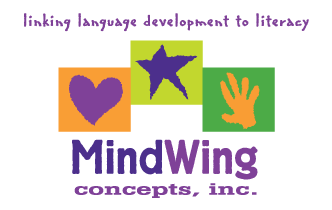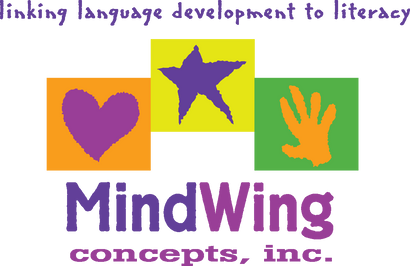Secure Checkout. FREE SHIPPING for Continental U.S. Orders over $60.
Menu
-
- Home
-
About Us
-
The Approach
-
Linking Language & Literacy
-
MindWing Learning
-
Learning Resources
-
SHOP
-
Blog
-
- About MindWing
- Our People
- Contact Us
- Your Account
- Login
-
United States (USD $)

Secure Checkout. FREE SHIPPING for Continental U.S. Orders over $60.
Technology Tuesday: Vocabulary, Summer Programming, and Story Grammar Marker®!
by Sean Sweeney June 09, 2015 3 min read 2 Comments
In this Technology Tuesday post, we will discuss resources for building vocabulary through stories and accessing a sequential approach to book selection, playing with words, and developing narrative and social cognitive skills.
Some years ago as an SLP in the elementary school setting, I was informed by a colleague of Isabel Beck’s revolutionary approach to targeting vocabulary. In the book Bringing Words to Life: Robust Vocabulary Development, co-written with Margaret McKeown and Linda Kucan, the authors describe a methodology for building vocabulary revolving around key principles:
- introducing vocabulary in context
- selecting “Tier 2” vocabulary exhibited by mature language users (e.g. accomplish, valuable, as opposed to basic Tier 1 vocabulary such as chair or playground or Tier 3 curriculum vocabulary such as sedimentary or treaty).
- developing “kid-friendly” definitions linking new vocabulary to known concepts, whereby accomplish would be defined as “to do something difficult.”
- providing many exposures to new words through word play, conversation, and storytelling.
After reading the book and sharing it with the school’s literacy specialist, I was provided with an amazing consultation opportunity to help train staff to implement this approach and fix the problem of an absent school-wide vocabulary program. Soon teachers were working with us to integrate vocabulary instruction with existing read-alouds and classroom topics, creating activities such as word associations and “Have you evers?”. For classrooms that were more time-taxed, the school purchased programs such as Scholastic’s and Steck-Vaughn’s spins on the approach. Soon classrooms were learning 5-7 new words weekly through a great collaborative approach, giving me the opportunity as an SLP to provide additional vocabulary practice in classroom and pull-out sessions.
Some years later, in supervising an SLP-Assistant who was to provide summer home services to a student, I was looking for a way to target the student’s goals: vocabulary development, narrative skills, and applying Social Thinking® concepts. I had often been asked by parents and colleagues for apps that are useful in developing vocabulary. There wasn’t an easy answer for that question. Many apps (e.g. Kidspiration, a concept mapping application, Pic Collage, a visual tool for any topic), could be used to target vocabulary, but required us to bring a context to the app. I had not yet found an app that would provide a sort of guide and sequence to developing vocabulary, particularly not within the contextual approach outlined above.
Along came World’s Worst Pet-Vocabulary, a strangely-titled but very robust (and free!) app containing contextual sets of Tier 2 vocabulary along with kid-friendly definitions and fun wordplay activities providing many exposures to the target words. Within this game-based app (marketed to grades 4-8 but containing words that are easily targeted for younger grades), students move Snargg, the ever-elusive titular pet, through environments to get him home, while completing vocabulary activities accurately to try and collect all the “pupcakes” he would like to eat! Activities target association, synonyms and antonyms, or “fixing the sentence.”


The WWP Vocabulary app gave us a focus and sequence for the summer work, and we soon were able to select books that served as contexts for targeting the vocabulary sets, as well as developing narrative with Story Grammar Marker®, with just a few examples provided here:

Click here to download as a PDF
Along with the above examples, other books were identified to correspond to the theme of the vocabulary set, including Dr. Seuss’ <a target=">Oh, The Places You’ll Go! (Words About Going Places, Level C, Set 2) and Bernard Waber’s word-minimal Courage, related to Action Sequences and List Structures, as well as concepts around positive self-talk. Googling phrases such as “kids’ books about accomplishments” was of great assistance in matching themes to books, as another tech tip for you!
Sean Sweeney
Sean Sweeney, MS, MEd, CCC-SLP, is a speech-language pathologist and technology specialist working in private practice at the Ely Center in Needham, MA, and as a clinical supervisor at Boston University. He consults with local and national organizations on technology integration in speech and language interventions. His blog, SpeechTechie (www.speechtechie.com), looks at technology “through a language lens.” Contact him at sean@speechtechie.com.
2 Responses
Lisa Friedman
August 31, 2020
Hey Sean
I absolutely loved this webinar and watched it live! I just tried to get the app WWP vocabulary app and it said iti s not available in this country.. is that correct?
Thanks, Lisa (SLP)
Leave a comment.
Comments will be approved before showing up.

Sean Sweeney
September 04, 2020
HI Lisa- it’s available in US at
https://apps.apple.com/us/app/worlds-worst-pet-vocabulary/id730540095
I can’t speak for other countries except UK as I know someone who checked there.